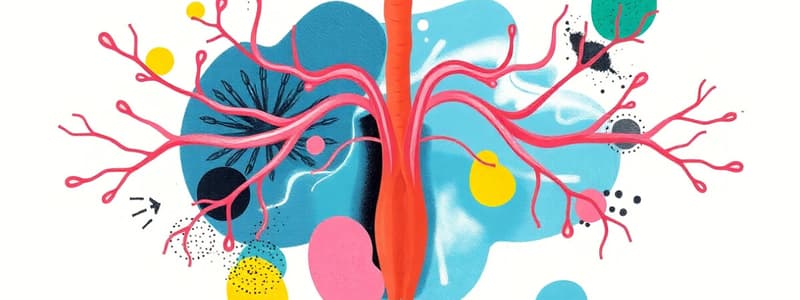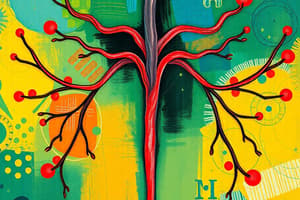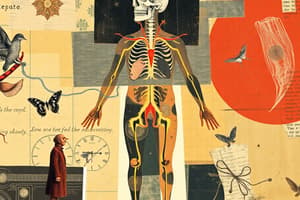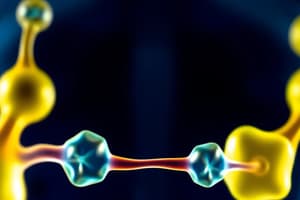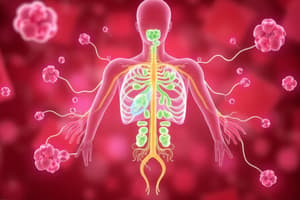Podcast
Questions and Answers
What type of hormones are synthesized from amino acids such as tyrosine?
What type of hormones are synthesized from amino acids such as tyrosine?
- Water-soluble hormones
- Lipid-soluble hormones
- Amines (correct)
- Steroid hormones
How do lipid-soluble hormones exert their effects on target cells?
How do lipid-soluble hormones exert their effects on target cells?
- They induce the production of ATP.
- They activate protein kinases on the membrane.
- They pass through the cell membrane and bind to intracellular receptors. (correct)
- They bind to cell membrane receptors.
What is the primary function of insulin in glucose control?
What is the primary function of insulin in glucose control?
- Suppresses the release of glucagon.
- Stimulates glucose release into the blood.
- Promotes uptake of glucose from the blood. (correct)
- Increases blood glucose levels.
Which of the following hormones is released by alpha cells of the pancreas?
Which of the following hormones is released by alpha cells of the pancreas?
The mechanism of action for which hormone involves binding to DNA to regulate gene expression?
The mechanism of action for which hormone involves binding to DNA to regulate gene expression?
What initiates the release of glucagon from the pancreas?
What initiates the release of glucagon from the pancreas?
What characterizes the action of water-soluble hormones compared to lipid-soluble hormones?
What characterizes the action of water-soluble hormones compared to lipid-soluble hormones?
Which of the following is NOT a method controlling hormone release?
Which of the following is NOT a method controlling hormone release?
What is the primary difference in speed between hormonal and nervous communication systems?
What is the primary difference in speed between hormonal and nervous communication systems?
Which of the following is NOT a characteristic of hormonal communication?
Which of the following is NOT a characteristic of hormonal communication?
What regulates energy use, metabolism, and growth within the body?
What regulates energy use, metabolism, and growth within the body?
How do water-soluble and lipid-soluble hormones differ in their mode of action?
How do water-soluble and lipid-soluble hormones differ in their mode of action?
What is the primary role of endocrine glands in the body?
What is the primary role of endocrine glands in the body?
Which statement best describes the major role of hormones?
Which statement best describes the major role of hormones?
Which statement about hormone action is true?
Which statement about hormone action is true?
What is a characteristic feature of the endocrine system compared to the nervous system?
What is a characteristic feature of the endocrine system compared to the nervous system?
Which hormones are produced by the thyroid gland?
Which hormones are produced by the thyroid gland?
What is primarily responsible for promoting the release of hormones from the anterior pituitary?
What is primarily responsible for promoting the release of hormones from the anterior pituitary?
What condition results from insufficient production of T4 and T3 hormones?
What condition results from insufficient production of T4 and T3 hormones?
Which of the following describes the hypothalamus's role in hormone secretion?
Which of the following describes the hypothalamus's role in hormone secretion?
Which statement is true regarding Type 2 diabetes?
Which statement is true regarding Type 2 diabetes?
Which condition is a special case of Type 2 diabetes?
Which condition is a special case of Type 2 diabetes?
What is the primary consequence of untreated hyperthyroidism?
What is the primary consequence of untreated hyperthyroidism?
Which mechanism primarily controls hormone levels in the endocrine system?
Which mechanism primarily controls hormone levels in the endocrine system?
What does the metabolic syndrome increase the risk of?
What does the metabolic syndrome increase the risk of?
Hyperglycemia may arise from which condition?
Hyperglycemia may arise from which condition?
What is one major issue related to diabetes in the healthcare system?
What is one major issue related to diabetes in the healthcare system?
Which of the following describes vasopressin?
Which of the following describes vasopressin?
What condition can result from an autoimmune attack leading to pancreatic β-cell failure?
What condition can result from an autoimmune attack leading to pancreatic β-cell failure?
Flashcards
Hormone
Hormone
A chemical messenger produced by endocrine glands, secreted directly into the bloodstream, and acting on specific target cells to regulate various bodily functions.
Endocrine system
Endocrine system
A system of glands that produce and secrete hormones, regulating various physiological processes like growth, metabolism, and reproduction.
Nervous system communication
Nervous system communication
The communication of signals through specialized cells called neurons, using electrical impulses and chemical neurotransmitters, for rapid and localized responses.
Hormonal communication
Hormonal communication
Signup and view all the flashcards
Homeostasis
Homeostasis
Signup and view all the flashcards
Hormone receptor interaction
Hormone receptor interaction
Signup and view all the flashcards
Water-soluble hormones
Water-soluble hormones
Signup and view all the flashcards
Lipid-soluble hormones
Lipid-soluble hormones
Signup and view all the flashcards
Insulin
Insulin
Signup and view all the flashcards
Glucagon
Glucagon
Signup and view all the flashcards
Mechanisms controlling hormone release
Mechanisms controlling hormone release
Signup and view all the flashcards
Steroid hormone regulation of gene expression
Steroid hormone regulation of gene expression
Signup and view all the flashcards
Antagonistic hormones
Antagonistic hormones
Signup and view all the flashcards
Negative feedback
Negative feedback
Signup and view all the flashcards
What does the posterior pituitary do?
What does the posterior pituitary do?
Signup and view all the flashcards
How does the hypothalamus control the anterior pituitary?
How does the hypothalamus control the anterior pituitary?
Signup and view all the flashcards
What does thyroid hormone do?
What does thyroid hormone do?
Signup and view all the flashcards
How is thyroxine secretion controlled?
How is thyroxine secretion controlled?
Signup and view all the flashcards
What happens if there's iodine deficiency?
What happens if there's iodine deficiency?
Signup and view all the flashcards
What is goitre?
What is goitre?
Signup and view all the flashcards
What is Graves' disease?
What is Graves' disease?
Signup and view all the flashcards
What are the symptoms of hyperthyroidism?
What are the symptoms of hyperthyroidism?
Signup and view all the flashcards
What is diabetes?
What is diabetes?
Signup and view all the flashcards
What is type 1 diabetes?
What is type 1 diabetes?
Signup and view all the flashcards
What is type 2 diabetes?
What is type 2 diabetes?
Signup and view all the flashcards
What is gestational diabetes?
What is gestational diabetes?
Signup and view all the flashcards
What is the metabolic syndrome?
What is the metabolic syndrome?
Signup and view all the flashcards
What are features of the metabolic syndrome?
What are features of the metabolic syndrome?
Signup and view all the flashcards
What is the SysVasc Consortium?
What is the SysVasc Consortium?
Signup and view all the flashcards
Study Notes
Hormones and Endocrine System
- Hormones regulate energy use, metabolism and growth
- Hormones maintain homeostasis
- Hormones are secreted by ductless endocrine glands directly into the bloodstream
- Hormones reach all parts of the body and react with specific receptors on target cells
- Minute quantities of hormones produce significant effects
- One hormone can have different effects in different cells depending on the receptors present
- Three main types of hormones: proteins (water soluble) - e.g., insulin, glucagon; amines (either water-soluble or lipid-soluble) - e.g., adrenaline; steroids (lipid soluble) - e.g., cortisol, oestrogen, and progesterone.
Lipid-soluble hormones
- Pass through the target cell membrane
- Bind to an intracellular receptor
- Hormone-receptor complex binds to DNA, turning specific genes on or off
- E.g., new protein is synthesised
Water-soluble hormones
- Bind to receptors on the cell membrane
- Receptor protein activates a signal transduction pathway
- A series of relay molecules transmit the signal
- Cell response occurs
Mechanisms controlling hormone release
- Specific metabolite in the blood, e.g., glucose
- Another hormone in the blood, e.g., thyroid-stimulating hormone (TSH)
- Stimulation of neurons, e.g., adrenaline by the autonomic nervous system
Pituitary gland
- Special network blood vessels link hypothalamus and anterior pituitary
- Hypothalamus releases stimulatory or inhibitory hormones that act on the anterior pituitary
- Anterior pituitary stimulates the release of other hormones
Posterior Pituitary
- Hormones (made in the hypothalamus) are stored and transported in vesicles
- Hormones are released into the bloodstream
- Example: Oxytocin and antidiuretic hormone (ADH)
Positive Feedback
- A process where the output of a system increases the input, leading to a larger response.
Thyroid
- Thyroid gland secretes thyroid hormone (T3 and T4)
- Regulates: heart rate, muscle tone, bioenergetics, digestive and reproductive functions
Control of Thyroxine Secretion
- Stimulus e.g., cold
- Hypothalamus secretes thyrotropin-releasing hormone (TRH)
- Anterior pituitary secretes thyroid-stimulating hormone (TSH)
- Thyroid gland secretes T3 and T4
- Body tissues increase cellular metabolism
Hypothyroidism
- Insufficient T3 and T4 production
- Thyroid gland grows to form a goitre
- Symptoms include weight gain, lethargy, and cold intolerance
Hyperthyroidism (Graves' disease)
- Excessive thyroxine production
- Constant activation of the hypothalamus and pituitary gland
- Symptoms include weight loss, tremor, sweating, and hyperactivity
Summary
- Two communication systems (nervous and endocrine)
- Endocrine effects are slower, more widespread, and longer lasting
- Hormone levels controlled by negative feedback and the hypothalamus controls secretions of the pituitary using nervous and hormonal control
Classification of Diabetes
- Type 1 Diabetes - autoimmune attack, managed with insulin, genetic risk
- Type 2 Diabetes - metabolic disorder, requiring therapy, lifestyle and genetic risk
- Gestational Diabetes - special case of type 2 diabetes, transient
Diabetes - Healthcare Burden
- Estimated UK numbers diagnosed with diabetes as of 2016-2017
- Significant proportion remains undiagnosed
- 10% of the total NHS budget spent on diabetes
- Diabetic complications further burden the healthcare budget (e.g., heart, kidney, eye, nerve, bladder disease, amputation, depression)
Metabolic Syndrome
- Cluster of medical disorders
- Increase risk of type 2 diabetes and cardiovascular disease
- Includes obesity
- Includes insulin resistance
- Includes hyperglycemia
Cardiovascular Disease Research
- Focus on high blood pressure and blood vessel problems
- Target vascular smooth muscle cells (VSMCs) and their interaction with myeloid cells (crucial components of the blood circulation)
- Two year project exploring proteomic profile comparisons to identify potential therapeutic targets for treating blood vessel problems (possibly preventing heart attacks and strokes)
SysVasc Consortium
- Clinical Research Project (2014-2017)
- Systems biology approach to identify molecular targets for vascular disease treatment
International Effort
- Significant effort across multiple countries
Type 2 Diabetes
- Multifactorial disease with multiple risk factors, multiple symptoms, and affecting multiple organs
T2D in the Metabolic Syndrome
- Defects in insulin responsiveness to fat, skeletal muscle, and liver tissue contribute to the development of type 2 diabetes (T2D)
- Compensatory responses (e.g., increased beta-cell function) attempt to maintain normal blood glucose levels but are overwhelmed over time
Insulin Sensitivity of skeletal muscle
- Details the signaling pathway involved in muscle glucose uptake, driven by insulin; multiple steps and protein interactions
Link between Diabetes, Obesity and Cancer
- High rates of diabetes and high BMI correlate with increased cancer incidence in various regions
- Estimated that 5.6% of all cancers in 2012 were attributable to combined factors of diabetes and high BMI
- Specific examples of elevated cancer risk with these combined factors (e.g., liver, endometrial cancer) were examined
Studying That Suits You
Use AI to generate personalized quizzes and flashcards to suit your learning preferences.
